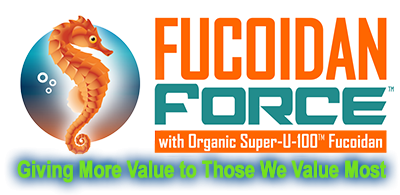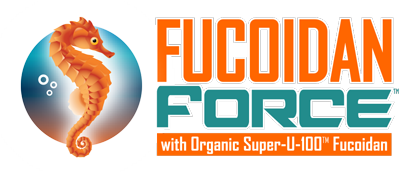Fucoidan is a 100% natural substance derived from brown seaweed, with many potential benefits. One of the most notable, proven by extensive peer-reviewed research studies, is fucoidan’s anti-cancer activity and its ability to act against many types of cancer.
This potent marine polysaccharide works by targeting cancer cells, forcing them through a natural process called apoptosis that causes cell death and removal from the body[1] while leaving healthy cells virtually unscathed. This effect is thought to be carried out through fucoidan’s ability to target the cancer cells through the stimulation of natural killer cells[2] in the body, while increasing IFN-gamma, which further stimulates the immune system to destroy abnormal cells. Additionally, fucoidan suppresses the growth and spread of cancerous cells, while causing a significant increase in the death of abnormal cells, which can mean all the difference in beating cancer.
Fucoidan Protects the Body from Toxic Treatments
Fucoidan has the added benefit of protecting the body from the effects of harmful chemotherapy and radiation treatments used in traditional approaches for battling cancer[3,4]. In this capacity, fucoidan has been found to work synergistically with these methods by helping to alleviate toxic effects, while also working to induce apoptosis and protect healthy cells from damage, activating the immune system, and halting abnormal cell growth and multiplication.
Fucoidan Helps to Shrink Tumors
Furthermore, fucoidan has also shown a remarkable ability to prevent angiogenesis[5], the formation of new blood vessels that “feed” tumor cells, cutting off their supply of essential nutrients needed for growth. This action is performed through the inhibition of a key molecule (VEGF) that promotes angiogenesis to cell membranes.
Fucoidan Interferes With Metastasis
Fucoidan binds to fibronectin[6], a cell adhesion molecule, and helps to prevent the attachment of cancerous cells and the formation of tumors. During the process of tumor cell migration, most tumor cells do not survive the forces of the blood stream and attack by immune cells. However, they can attach to platelets and survive in the vascular system. By binding to fibronectin, fucoidan inhibits this action and effectively reduces the number of surviving tumor cells. In addition, the immune boosting effects of fucoidan assist the body’s attack and effectively aids in the fight against cancerous cells.
And the Research Continues…
The amount of research and knowledge of fucoidan’s many benefits continues to grow every day, demonstrated by the 1298 results when “fucoidan” is searched on the U.S. National Library of Medicine’s website. There is no doubt that, as this research continues to progress, many cancer therapies will evolve using fucoidan for treatment and support.
References:
- Aisa Y, Miyakawa Y, Nakazato T, Shibata H, Saito K, Ikeda Y, Kizaki M. Fucoidan induces apoptosis of human HS-sultan cells accompanied by activation of caspase-3 and down-regulation of ERK pathways. Am J Hematol. 2005 Jan;78(1):7-14.
- Maruyama H, Tamauchi H, Hashimoto M, Nakano T. Antitumor activity and immune response of Mekabu fucoidan extracted from Sporophyll of Undaria pinnatifida. In Vivo. 2003 May-Jun;17(3):245-9.
- Ikeguchi M, Yamamoto M, Arai Y, Maeta Y, Ashida K, Katano K, Miki Y, Kimura T. Fucoidan reduces the toxicities of chemotherapy for patients with unresectable advanced or recurrent colorectal cancer. Oncol Lett. 2011 Mar;2(2):319-322. Epub 2011 Jan 21.
- Jeong BE, Ko EJ, Joo HG. Cytoprotective effects of fucoidan, an algae-derived polysaccharide on 5-fluorouracil-treated dendritic cells. Food Chem Toxicol. 2012 May;50(5):1480-4. doi: 10.1016/j.fct.2012.01.034. Epub 2012 Feb 1.
- Liu F, Wang J, Chang AK, Liu B, Yang L, Li Q, Wang P, Zou X. Fucoidan extract derived from Undaria pinnatifida inhibits angiogenesis by human umbilical vein endothelial cells. Phytomedicine. 2012 Jun 15;19(8-9):797-803. doi: 10.1016/j.phymed.2012.03.015. Epub 2012 Apr 15.
- Liu JM, Bignon J, Haroun-Bouhedja F, Bittoun P, Vassy J, Fermandjian S, Wdzieczak-Bakala J, Boisson-Vidal C. Inhibitory effect of fucoidan on the adhesion of adenocarcinoma cells to fibronectin. Anticancer Res. 2005 May-Jun;25(3B):2129-33.







 © 2016 fucoidanforce.com. All rights reserved.
© 2016 fucoidanforce.com. All rights reserved.